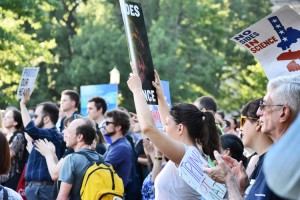U.S. Quits Paris Agreement
June 2, 2017
Yesterday, June 1, United States President Donald Trump announced that the United States would formally withdraw from the Paris Agreement, an international treaty designed to combat global warming. The decision to withdraw from the treaty represented a sharp break with leaders of nearly all nations and went against the wishes of thousands of corporate executives, economists, environmentalists, other U.S. politicians, scientists, and even members of the president’s own Cabinet. Trump’s decision to withdraw from the treaty met with immediate international and domestic scorn and spurred numerous protests.

On June 1, 2017, protesters gather outside the White House in Washington, D.C., moments after President Donald Trump announced that the United States would withdraw from the Paris Climate Agreement. Credit: Kellybdc (licensed under CC BY 2.0)
By joining the Paris Agreement in 2015 and ratifying it in 2016, the United States had voluntarily committed to cut back on the use of polluting fossil fuels, develop more green (environmentally friendly) technology, and raise funds to help poorer countries reduce their greenhouse gas emissions. Trump, who has previously called climate change a “hoax,” sees these commitments as an unfair economic burden on the United States. Most evidence, however, shows that climate change is real and that moving to green technology actually stimulates economic growth.
The goal of the Paris Agreement is to slow and eventually cease the rise in global temperatures that has sharply increased in the last few decades. Scientists predict that, if global warming continues unchecked, it will damage human society and the environment. For example, global warming could melt enough of the ice near Earth’s poles to raise sea levels, flooding many coastal cities. Global warming could lead to more widespread droughts. It could also raise the risk of extinction for many plant and animal species. Already, global warming has greatly reduced glaciers at the North and South poles, harmed the world’s coral reefs, and created ever more erratic and extreme weather patterns.
Withdrawing from the Paris Agreement is a lengthy process that will take until November 2020 to complete, leaving time for the United States to rejoin the treaty. A number of U.S. cities and states have already announced they will continue to comply with the provisions of the Paris Agreement whether the federal government does or not.


